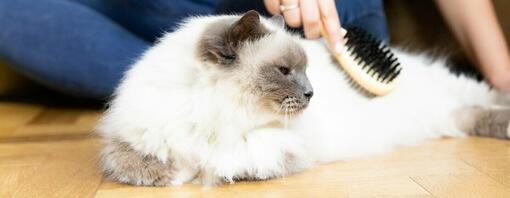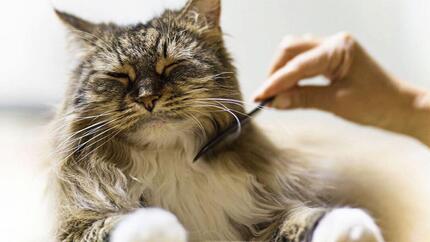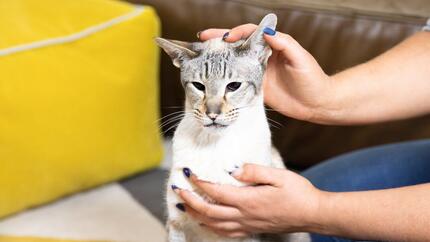
Have you gone to give your cat a loving stroke and noticed a thinning coat, bald spots or patches? Sudden hair loss, also known as cat alopecia, can be a concerning and worrying sight for any cat owner. There are various reasons why cats might lose their fur, and it's essential to consult a vet for a proper diagnosis and ultimately treatment.
Could it be stress-related? Are there any underlying health conditions contributing to hair loss? Identifying and addressing these factors early on can help prevent further complications and ensure your cat's wellbeing. Learn more about how to identify sudden feline bald patches, possible signs and appropriate treatments.
Why is my cat losing its fur?
Hair loss in cats can be caused by several common factors (e.g. stress, skin conditions, parasites, or a poor diet). However, it's important to note that shedding is a normal part of a cat's coat cycle. Learn how to determine if your cat's hair loss is something to worry about below.
There are several reasons why your cat might be losing hair. Here are some common possibilities:
- Stress: Changes in the environment, new pets, or other stressors can cause cats to groom excessively, leading to hair falling out.
- Allergies: Food allergies, environmental allergies, or flea allergies can irritate the skin and cause hair loss.
- Fungal Infections: Ringworm and other fungal infections can cause circular patches of hair loss.
- Hormonal Imbalances: Thyroid disorders and other hormonal issues can contribute to hair loss.
- Nutritional Deficiencies: A lack of essential nutrients can cause hair loss in cats.
- Parasites: Fleas, ticks, and mites can irritate the skin and cause hair loss.
- Underlying Medical Conditions: Certain diseases, such as cancer or kidney disease, can manifest as hair loss.
In order to determine the causes of your cat's hair loss always seek advice from your vet.
Skin conditions can cause cat hair loss
Some skin conditions or infections could cause your cat to be losing fur. Take a look at some possible conditions that could be causing this:
- Your cat may have an infection such as cat ringworm (a fungal infection)
- An infestation of parasites such as mites or fleas
- A cat skin condition caused by an allergy.
As these will all be irritating to the skin, your cat might find it impossible not to scratch! By over-grooming or itching and scratching, they can give themselves bald patches as well as possibly fur-balls from swallowing hair as they lick or chew the area.
Can stress cause alopecia in cats?
You’ve heard of the phrase “tearing your hair out” when under pressure, and this can also be true for anxious or upset cats. Sometimes, a stressed cat will start to pull out their fur. It’s not just stress that can cause cats to ‘pull their hair out’ however. Cats can also over-groom an area if it’s causing pain, for example if they’re suffering from a sore joint.
Can hormones make cats lose their fur?
Bald spots on your cat and hair loss can also be caused by a hormonal imbalance. Specific hormones are responsible for your cat’s hair growth and a surplus or deficiency in this may also be the reason why your cat is losing fur.
You might also find that your pregnant or lactating cat loses their hair due to the changes in their hormones during this time, but don’t be too alarmed as fur should eventually grow back over time.
General poor health, nutrition or an underlying disease might cause hair loss in cats
It’s important for cats to have a balanced diet with high-quality cat food, as an unhealthy diet, poor health or an undetected disease can all be causes for your cat to lose their hair. As these are all quite broad reasons, it’s important to visit your vet to identify the underlying cause.
Some causes for hair loss in cats can also affect humans and are contagious. Although this is unusual, it’s worth booking an appointment with your vet as soon as possible to avoid an unhappy pet and owner, too.
Understanding Shedding Seasons in Cats to Help Determine Whether Your Cat's Hair Loss is Normal
Remember that cats shed their fur throughout the year, but they experience more intense shedding periods during the summer and autumn, known as cat moulting season – especially if they are outdoor cats. This seasonal shedding is a natural process that helps cats regulate their body temperature and adapt to changes in their environment.
If your cat's hair loss is evenly distributed across their body without any noticeable bald patches, it's likely just a normal part of the shedding cycle. However, if you observe excessive hair loss, bald spots, or other unusual symptoms, it's advisable to consult with your vet. They can rule out any underlying health issues and provide guidance on managing your cat's shedding.
Steps your vet might take to determine the underlying cause of your cat's hair loss
Your vet will give your cat a thorough check over to find out what’s causing their alopecia. If they discover fleas, which are a common cause of itching and subsequent hair loss, they may recommend flea treatment (which you should keep up to date, anyway).
Your vet will give your cat a thorough check over to find out what’s causing their alopecia. If they discover fleas, which are a common cause of itching and subsequent hair loss, they may recommend flea treatment (which you should keep up to date, anyway). Your vet might also take hair samples or scrape a little sample of skin to test for ringworm and parasites – don’t worry, this is completely painless. Occasionally your vet may decide to take a small skin sample from your cat under anaesthetic or to perform an allergy skin test to check for cat skin conditions.
Alternatively, they may take a blood sample to look for underlying diseases that could be causing your cat's hair loss. If, at the end of their investigation, there’s still no obvious reason for feline fur loss, your vet may refer you to a veterinary dermatologist. If, however, you or your vet suspect that there could be a behavioural reason for your cat's over-grooming and making themselves lose hair, then you may need to discuss your cat’s lifestyle to work out what might be causing them stress or even consult a feline behaviourist.
Cat hair loss treatment: how is alopecia treated?
Treating cat alopecia depends on the cause behind your cat's hair loss. Once your vet has run some tests, you’ll be able to get the right treatment.
Common treatments for cat alopecia include:
- Medication: Your vet will recommend flea control products or an anti-fungal treatment if they discover parasites or ringworm.
- Dietary Plan: For food allergies, a veterinary dermatologist can help identify allergens and develop a tailored diet plan.
- Stress Management: Feline behaviourists can help identify stressors and create a behaviour modification plan to reduce anxiety. Changes to the environment, identifying and reducing stressors, and providing enrichment and interactive play can help to reduce feline stress.
- Pain Management: Cats often hide pain and so the first symptom you might notice is hair loss. work with your vet to identify and address the underlying issue. This is crucial for recovery, together with the necessary treatment and medication.
Finally, you need to remember the importance of having regular vet check-ups, monitoring your overall cat’s appearance, addressing any underlying causes such as stress, allergies, infections and more. By closely monitoring your cat and seeking advice from a vet when necessary, you can help them maintain a healthy coat and help them live a long and happy life.












